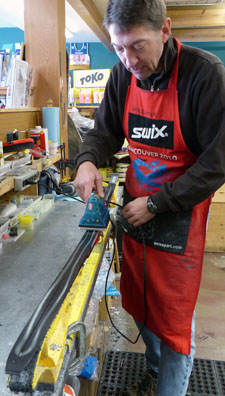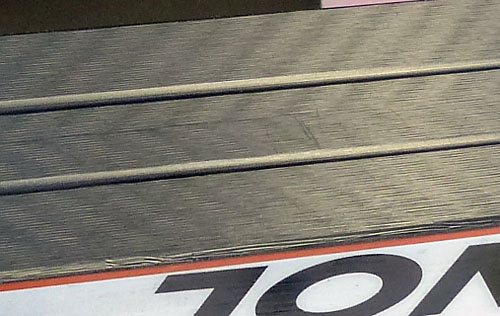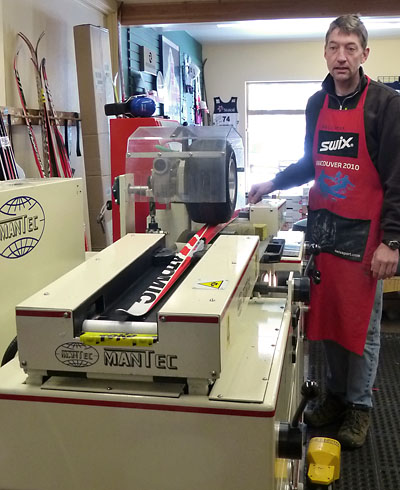 Mark Waechter hot waxes a ski. A Fine Difference
Mark Waechter's Nordic Ultratune
story and photos by Sheela McLean
Mark Waechter likes the Methow so much that he came here eight years ago and started a one-person business on Winthrop’s main street: Nordic Ultratune.
Bundles of cross-country skis arrive via FedEx and United Parcel Service at his shop from colder parts of the country. Ski teams send their gear from Alaska, Minnesota, Montana, Maine and Oregon, for instance, and so do elite skiers from all over the place. Some big-time skiers send him six skis at a batch. He said he’s made a good friend of “Lynn the Fed-ex driver,” who has delivered skis all eight years of his business.
He conditions about 1,000 pairs of skis per year.
Waechter explained the plastic surface of a ski can get dried out - similar to the way the outside of a block of cheese gets stiff and hard - because of sun, dry air, snow abrasion and overheating, for instance by ski wax-melters. The ski becomes less slippery.
In his shop, Waechter has a micro-grinder that removes .02 millimeters of plastic from the bottom of the ski, making them perfectly flat. But “a ski can be too smooth” he said.
Waechter’s machine, made in Italy, “is the only one like it in North America.” It grinds very fine, very specific patterns into the bases of the skis that have been micro-ground smooth - more texture for sloppy snow, less texture for new snow.
 One of the very fine, very specific micro textures that Mark Waechter can grind into a ski base at his shop in Winthrop. Getting the ski’s surface right is a balancing act between putting on a very delicate, tiny bit of texture, to help grab in sloppy snow, or having very smooth bottoms, to slide over the rough crystals of fresh snow.
Fresh snow “can work against you. It’s like Velcro,” he said. By contrast the crystals of older snow have been broken off and smoothed. “They’re like little balls.”
“Skiers at the World Cup level” he said, need “a whole bag of skis for different conditions.” And Waechter and his Italian machine can get them into shape.
October and November are key months for Waechter: that’s when the serious racers are preparing for the racing season. The first ski races of the year are usually around Thanksgiving, he explained.
 This Italian-made grinding machine is the centerpiece of the Nordic Ultratune shop. In winters, he has traveled to places such as Austria, Spain, Norway and France, “doing service work for the World Cup and Olympics.” That is when he’s not at home, working on skis that come by mail or arrive through the door of his shop, where he sells skis and ski paraphernalia as well as his services.
He started working big ski races in 2005. In 2010 the Slovenian team came to a race in this country. “They knew nothing about North America,” Waechter said, so he became their “cultural attaché,” as well as their ski conditioning expert, and he’s worked with that team quite a bit since. He may travel to the 2014 Olympics in Sochi, Russia to work with them.
In spring time, Waechter travels and researches new skis on the market, then orders what he thinks are the best to put in his shop. He says his goal in his business is to “add real expertise.” He knew that in order to make a living here he had to “add something new to the program and not rely solely on the small valley population.”
He wants to serve the less skilled skiers also. “What they want is the same as what we all want - good skis that work.”
Before Waechter came to the Methow, he was a research and development engineer working in the aerospace and medical fields. He started coming to the valley in 1998. Finally his friends started asking him “can’t you get a job over there?”
Sure, he told them, “there are lots of jobs over there. Everybody I know has two jobs.”
He says its working. “I’m not getting rich,” he said. “I’m just making it.”
1/16/2013
|
